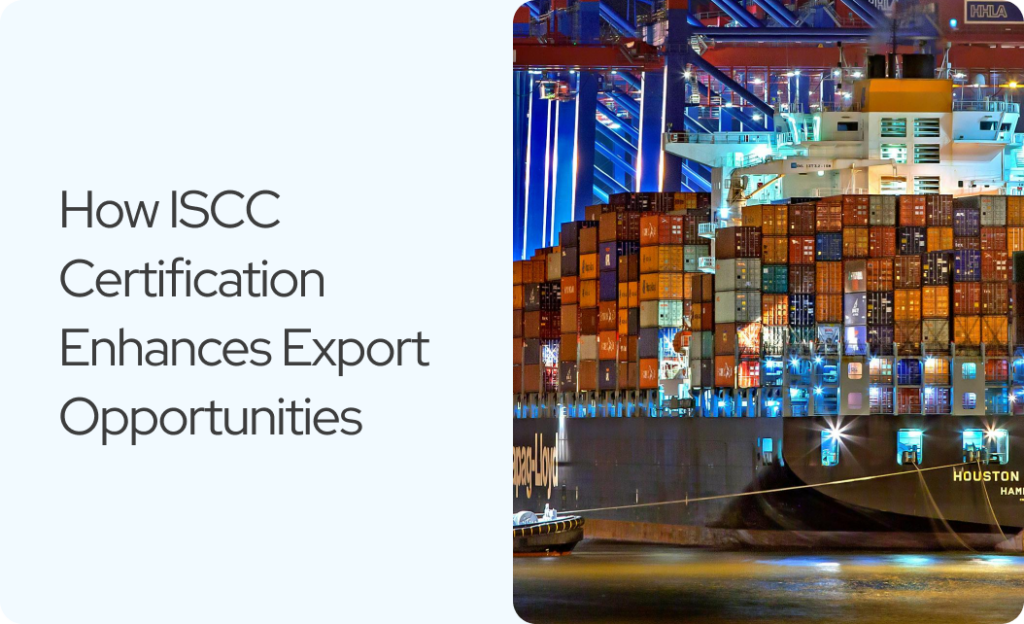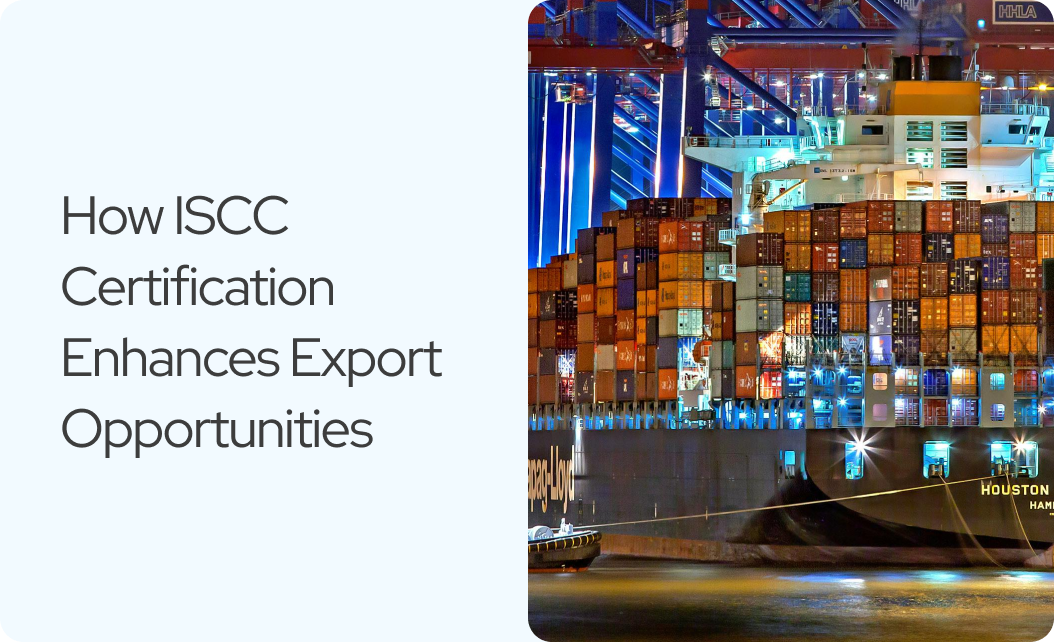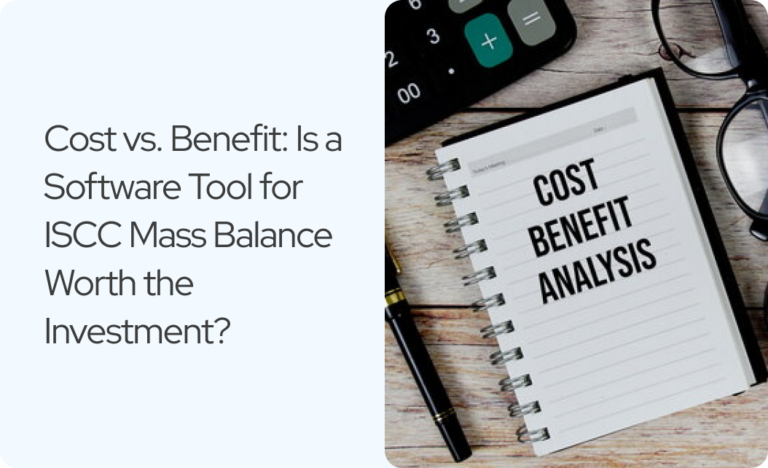How ISCC Certification Enhances Export Opportunities

In today’s global economy, exporting isn’t just about offering a good product. It’s about meeting rising expectations around sustainability, transparency, and compliance—especially in high-value markets.
That’s where ISCC Certification comes in.
Originally developed to verify sustainability in biofuels, ISCC (International Sustainability and Carbon Certification) has evolved into a powerful enabler for global exporters. More than a compliance badge, it serves as a passport to regulated markets, premium buyers, and long-term growth.
This blog explores how ISCC Certification helps exporters not just meet standards but gain a lasting edge.
Why ISCC Certification Matters for Exporters
Export markets are changing fast.
Sustainability criteria are no longer optional. They are often mandatory. The EU, Japan, South Korea, and other advanced markets now require verifiable proof of sustainability for imports.
ISCC Certification provides that proof. It verifies traceability, environmental responsibility, and regulatory alignment, making it easier for certified exporters to enter new markets, win buyer trust, and unlock better pricing.
Without certification, entry into many premium markets is blocked. With ISCC, your products are welcomed and often rewarded.
The Changing Global Trade Landscape
Across continents, trade policies are becoming climate-conscious:
- The European Union is leading the shift with RED III and carbon border measures
- Asia-Pacific countries are aligning import requirements with ESG goals
- Emerging markets are introducing sustainability-linked tariffs and incentives
In January 2025, the European Commission expanded ISCC’s recognition to include RFNBOs, RCFs, and forest biomass, opening up new product categories for certified exporters.
Certification is no longer a formality. It is a filter for access.
Market Access Advantages by Region
1. European Union
The EU and UK are among the most regulated and rewarding destinations for certified exporters.
ISCC EU certification is essential for access to:
- Renewable fuels
- Bio-based chemicals
- Certified agricultural goods
Price premiums of 20 to 40 percent are common, especially in sectors like biofuels and packaging. Many EU buyers offer multi-year contracts with sustainability-linked pricing, providing stability in volatile markets.
2. Asia-Pacific
Countries like Japan, South Korea, Australia, and Singapore are rapidly tightening sustainability criteria for imports. Certified products are preferred, particularly in:
- Renewable energy supply chains
- Industrial raw materials
- Eco-labeled consumer goods
Singapore’s strong alignment between policy and finance makes it a strategic launchpad for ISCC-certified trade into Southeast Asia.
3. Emerging Markets
As more countries prepare to adopt carbon border adjustment mechanisms or similar trade policies, early movers with ISCC certification will have a first-mover advantage.
Future growth sectors, such as climate-smart agriculture, circular chemicals, and green building materials will increasingly require verifiable certifications.
Industry-Specific Export Advantages
Agriculture and Food
ISCC-certified farms and processors can access sustainability-driven segments in the EU, UK, and Asia. Certification proves:
- Ethical sourcing
- Land-use compliance
- Emissions reduction across the supply chain
This is especially valuable for exporters of grains, oils, and processed food ingredients.
Renewable Energy and Biofuels
ISCC is essential for exporting:
- Biodiesel
- Renewable diesel
- Sustainable aviation fuel (SAF)
- Biogas and RFNBOs
Certified exporters can secure 15 to 30 percent higher margins, and in segments like SAF, premiums may exceed 50 percent.
Chemicals and Industrial Inputs
ISCC unlocks access to Europe’s bio-based and circular chemical markets, where recycled and renewable content is now a procurement requirement.
Certification positions exporters as preferred suppliers in:
- Plastics and packaging
- Industrial solvents and lubricants
- Green building materials
Compliance, Simplified
Unified Regulatory Alignment
Rather than juggling country-specific certifications, ISCC provides a single framework that meets the requirements of multiple jurisdictions. This simplifies:
- Export paperwork
- Audit preparation
- Cross-border regulatory approvals
Verified Supply Chain Transparency
ISCC’s traceability framework helps exporters document and prove every step of their product’s journey, from origin to destination. This:
- Avoids customs delays
- Builds buyer confidence
- Speeds up contract negotiations
Financial Advantages for Certified Exporters
Higher Profit Margins
Certified exports routinely command 15 to 35 percent higher pricing, especially when buyers integrate sustainability premiums into long-term contracts.
Access to Green Financing
ISCC-certified exporters are eligible for:
- ESG-linked trade credit
- Sustainability-linked loans
- Lower-cost capital from green finance institutions
These tools improve cash flow and reduce financial risk.
Protection from Regulatory Shocks
ISCC certification ensures you’re aligned with current and emerging regulations, reducing the risk of losing access to key markets as rules evolve.
How to Implement ISCC for Export Success
1. Choose the Right Certification Path
- ISCC EU: Required for exporting to Europe, especially for fuels and bio-based materials
- ISCC PLUS: Ideal for broader global exports, including packaging, chemicals, and food
2. Integrate Certification Into Operations
Align your:
- Logistics and inventory systems
- Supplier documentation
- Customer and trade documentation workflows
3. Leverage Digital Tools for Scale
Platforms like Carboledger help exporters:
- Automate traceability and mass balance systems
- Generate audit-ready documentation
- Stay current with ISCC standards and regional updates
Looking Ahead: Trends to Watch
Broader Certification Scope
ISCC is rapidly expanding to include more recycled, circular, and renewable materials, opening doors to future-focused markets.
Digital Transformation
Exporters that adopt AI, IoT, and blockchain tools for traceability and compliance will enjoy faster approvals, higher trust, and stronger market visibility.
Final Thoughts: Why ISCC Is a Smart Export Strategy
In an era of climate-conscious trade, ISCC Certification is no longer a competitive advantage. It is a competitive necessity.
It helps your products cross borders, win trust, and command better margins. Whether you’re exporting food, fuels, chemicals, or industrial inputs, ISCC puts your sustainability credentials on record and into the hands of global buyers who care.
Sustainable trade is not just the future. It is already here. And ISCC is your key to thriving in it.
Disclaimer:
Carboledger Inc. is an independent software provider. References to ISCC or any other certification schemes in this article are made solely for informational and educational purposes. Carboledger is not affiliated with, certified by, or endorsed by ISCC System GmbH or any certification body. The content does not constitute certification advice or official guidance.





